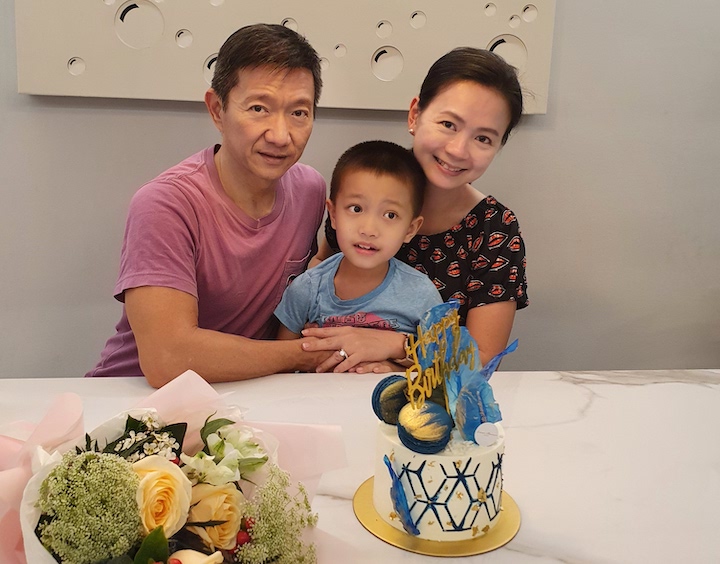
 Post Category - ParentingParenting - Post Category - Toddler & PreschoolerToddler & Preschooler - Post Category - Older KidsOlder Kids
Post Category - ParentingParenting - Post Category - Toddler & PreschoolerToddler & Preschooler - Post Category - Older KidsOlder Kids“It takes a village to raise a child but a supportive society to raise a child with special needs.” One father whose son was diagnosed with moderate autism spectrum disorder shares their story
In August 2013, we welcomed Xeyrus – our first (and only) child. He was a handsome baby looking perfectly normal at birth. In fact, he responded by opening his eyes to his mother calling out his name when he was in the warming unit shortly after he was born. But his development thereon was slow.
Xeyrus only started walking at 18 months and couldn’t communicate verbally. Despite that, he was a happy baby, enjoyed music and often hummed along to nursery rhymes. He was fascinated with automation like fans, lifts, automatic doors and escalators. He enjoyed his walks but would get extremely upset if we changed the route. His tantrums were uncontrollable, and we often received stares from the public when Xeyrus had his episodes of terrible meltdowns. I must admit I wasn’t someone with good paternal instincts and Xeyrus being our first and only child, both my wife and I thought it was just a phase and that he would somehow catch on and turn out fine.
A tragedy happened when Xeyrus was two. We lost him in a shopping mall for five minutes only to find him with two of his digits crushed by an escalator. Fortunately, a team of skilled surgeons was able to put his fingers back together. Though never as good as new, it was lucky that the digits healed well. This incident was a wake-up call for me and I am never the same ignorant father I once was. Guess it was guilt that woke up the paternal side of me and I became very protective over him. To the point that my wife thinks I am overly protective.
Read More: Frequently Used Terms and Phrases for Special Needs Learning in Singapore

After Xeyrus recovered from the accident, we enrolled him into a nearby government-subsidised nursery. My wife would receive frequent calls from the school informing us that Xeyrus wasn’t participating in class. He would constantly stare at the ceiling fans or played with the doors. The teachers couldn’t handle his meltdowns when they tried to break him away from his obsessions. He was often “blamed” for being disruptive and ill-disciplined in class. The principal urged us to send Xeyrus to the hospital for check-ups on his development milestones. The last straw was when Xeyrus almost ran out of the school. He managed to unlatch the kiddy’s door that led to the unlocked entrance. For the sake of his safety and our sanity, we decided to scout for another pre-school.
Diagnosed with moderate autism spectrum disorder
Xeyrus was eventually diagnosed with moderate Autism spectrum disorder (ASD) after several rounds of checks and examinations by the therapists, psychiatrists, and doctors at KKH. Though we were saddened by the news, it put everything in perspective about his behaviours. We brought Xeyrus to a private child psychiatrist to get a second opinion, which did not deviate far from the hospital’s diagnosis.
KKH arranged for him to attend the EIPIC programme – Early Intervention Programme for Infants and Children (up to 6 years old) at CPAS School in Pasir Ris. The EIPIC programmes support children who require medium to high levels of early intervention support, and aim to increase the developmental growth potential of the child, minimise the development of secondary disabilities, and maximise integration in mainstream settings.
Early intervention help from occupational therapists and speech therapists
At 3 years old, Xeyrus attended the two hours of lessons every Monday to Thursday at EIPIC, in a small and conducive classroom setting (3 to 5 students to a teacher and teaching assistant). He also worked with occupational therapists for his fine and gross motor skills, and speech therapists for his communications.
When he was not learning at EIPIC, he’d be spending his time in a private nursery. My wife and I spoke at length with the director of the school. We shared his challenges and asked in-depth questions about how the school would handle a boy with special needs like him.
With the EIPIC programme and the new pre-school, Xeyrus grew leaps and bounds during the first year. He began to speak with simple words, he was calmer and happier. He was receptive to trying new things. His gross and fine motor skills improved as well. The teachers use PECS (Picture Exchange Communication System) to help Xeyrus with his communication. And we also worked closely with the teachers at EIPIC to reinforce what he learned in school at home. At the same time, we had a home-based speech therapist work on his verbal communication.
When Xeyrus turned five, we had to plan for his formal school education. The teachers at EIPIC recommended for him to go through a school readiness psychiatric assessment to evaluate what type of education system (mainstream or SPED) would suit him. Such assessment would be required should we decide to send him to a SPED (Special Education) school. After several rounds of long questionnaires and interviews, the psychiatrist suggested a SPED school. Hoping that he would one day blend into the mainstream education environment, my wife and I decided to defer his formal education by a year.
Read More: Guide To Inclusive Schools, Early Intervention Centres & Special Education Schools in Singapore
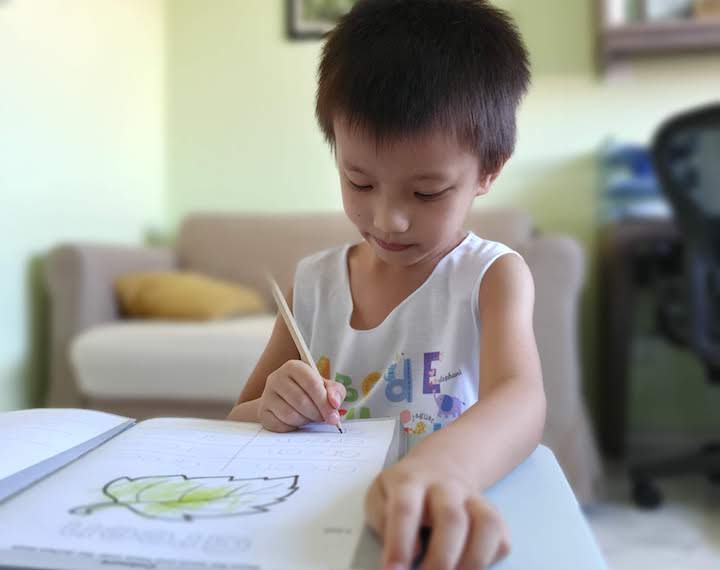
It was thanks to HBL that we understood how he was struggling with school
December 2019 was another turning point. Along with Covid-19, came the circuit breaker. That marked the beginning of home-based learning (HBL) for Xeyrus. The stay-home learning provided us with a great insight into Xeyrus’s learning progress. Though he was picking up new things during his first two years at the private pre-school, his learning had reached a plateau. He couldn’t keep up with the advanced kindergarten syllabus as we saw how disengaged he was during the HBL. Furthermore, the size of the class was quite big (up to 12 students), and the teachers were quite caught up with the heavy schoolwork. We terminated the service and explored other learning centers, speech therapy and courses (such as piano and coding).
There were up and downs in his development from 3.5 to 7 years old. Overall, I am truly grateful to the teachers in EIPIC for teaching him so many skills that we couldn’t get him to perform such as getting him out of pull-up diapers at 6 years old.
While we gave up on the idea of sending Xeyrus to a public school, we applied to a Pathlight School – a school providing a unique blend of mainstream academics and life readiness skills for students on the autism spectrum and related conditions. We were hoping for Xeyrus to progress into the mainstream environment through Pathlight. Unfortunately, our application was declined. The multi-task panel recommended Maitri Programme at METTA, a pilot programme designed for children with moderate to severe autism.
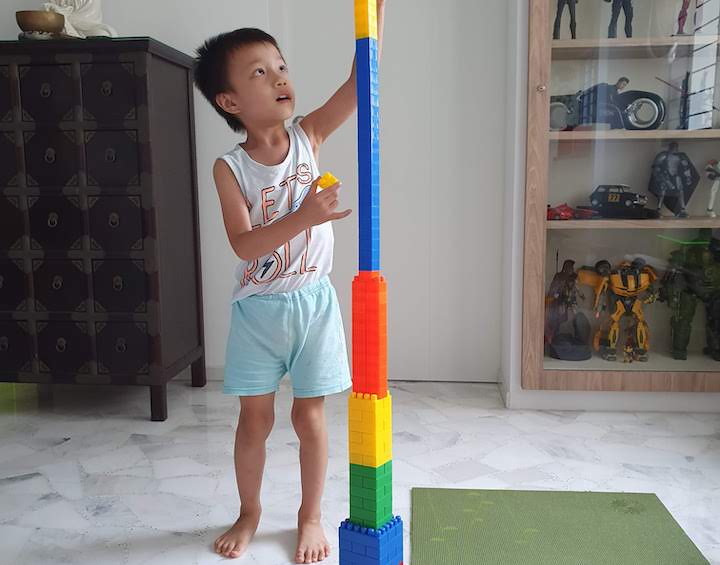
Entering a special needs school would close the door to mainstream education in SG
SPED schools cater specifically to students with special needs who require more intensive and specialised assistance. Here there is also vocational training which can help students find employment after completing their studies. The learning at SPED school is vastly different from mainstream education and so if he were to go this route, he would never be able to re-enter the public school system.
After much discussion with the educators from the Maitri Programme, we were convinced that it was the best option for Xeyrus. The new school was very well planned and thought out. It offers 25 places per cohort for students aged 7-18 years old and has a total school capacity of 300 places. The subjects offered for the young students entering Maitri Programme are: Functional Literacy & Communication, Functional Numeracy, Personal Management, Social Emotional Learning, Home Living & Home Economics, Adapted Physical Education and Performing & Visual Arts.
The teachers were experienced and passionate in helping children like Xeyrus to progress. It’s his second year at the school, and he is doing well and looks forward to going to school every day. Though he had challenges in some of the areas, periodically, he would surprise us with what he is capable of.
Read More: Dyslexia in Singapore: How I helped my daughter learn to read
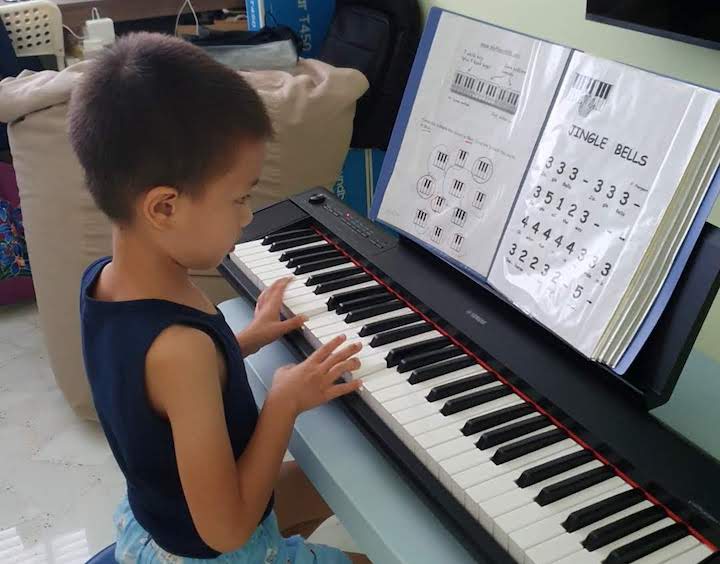
My son has taught us so much
Xeyrus is generally a happy and cheerful boy. Disadvantaged by his communication skills, he is slow to learn. He has a short attention span towards things he has no interest in. With ASD, he strives in a daily fixed routine, he is obsessed about lining up his toys and shoes and will be upset if things do not go his way.
He has a remarkable memory. He is also pitch-perfect and can play simple tunes on the keyboard by listening. He still loves his automation like lifts and escalators, but his obsession has toned down. He is very aware of others’ emotions, very affectionate (to people he likes), and is eager to please. Even his pre-school psychiatric assessment at 5 years old showed mixed signals. He strives in cause and effect, and often negotiates for screen time or walks for work completed i.e piano practice, writings, and homework.
Now at 8, he can moderate his emotions and is able to express his wants in short sentences. Though we are not able to have long conversations with him, his affection is our biggest reward. We have come a long way with Xeyrus. He has taught us so much. We learn that every child with special needs is unique. As one of Xeyrus’s challenges is in speech, we’ve learned to observe him through his behaviours and ask simple questions to understand his wants and frustrations.
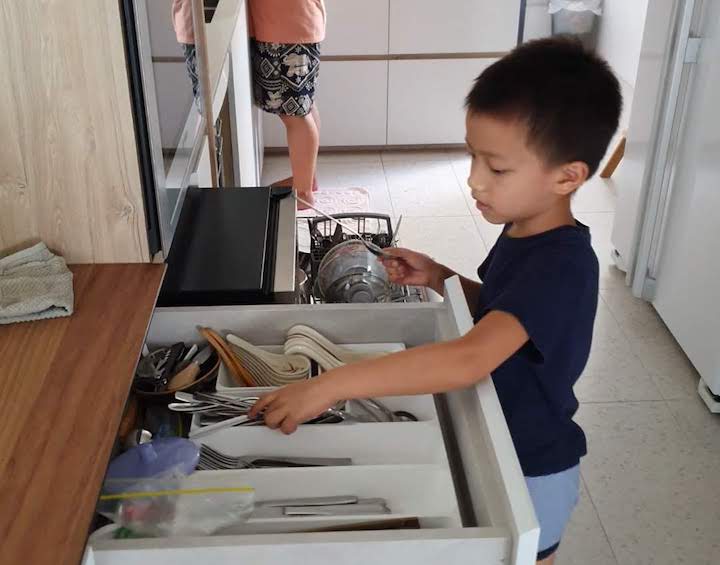
We learn that patience and consistency pay off with him. We try not to overreact or react too quickly when tantrums occur. Often, we would observe and ask questions to understand his distress. We get him involved in simple chores at home by breaking down the tasks into small steps and give him reassurance that we are here for him. On consistency, we must keep to our word (because he always remembers!) We try not indulge him and discipline him when necessary (ultimately, he is still a child and will always try to push our boundaries). We celebrate every milestone our son achieves.
It takes a village to raise a child but a society to raise a child with special needs. We considered ourselves blessed with the support we receive from our family members and the educational system in Singapore. Xeyrus is fortunate to have met many educators who truly care and adore him. Even our domestic helper genuinely loves him like her own son.
We hope that he will grow up to be a fully independent young man and able to contribute to society and do what he enjoys. One small step at a time.
If you are a caregiver of someone who has special needs and need to speak to someone for support please call the National Care Hotline (1800-202-6868).






 View All
View All





 View All
View All









 View All
View All




